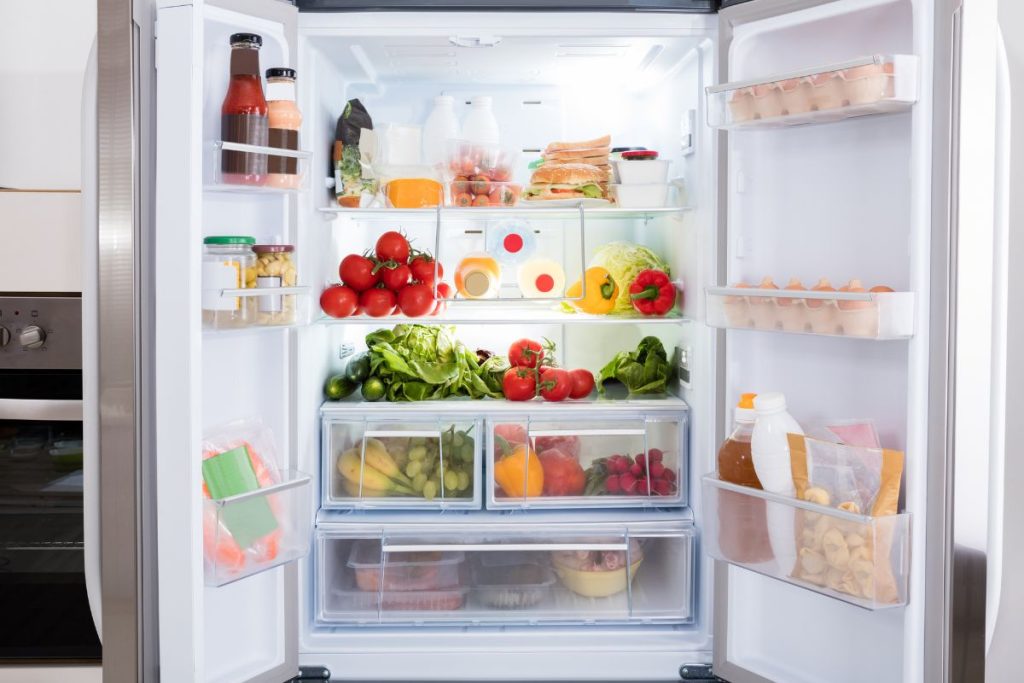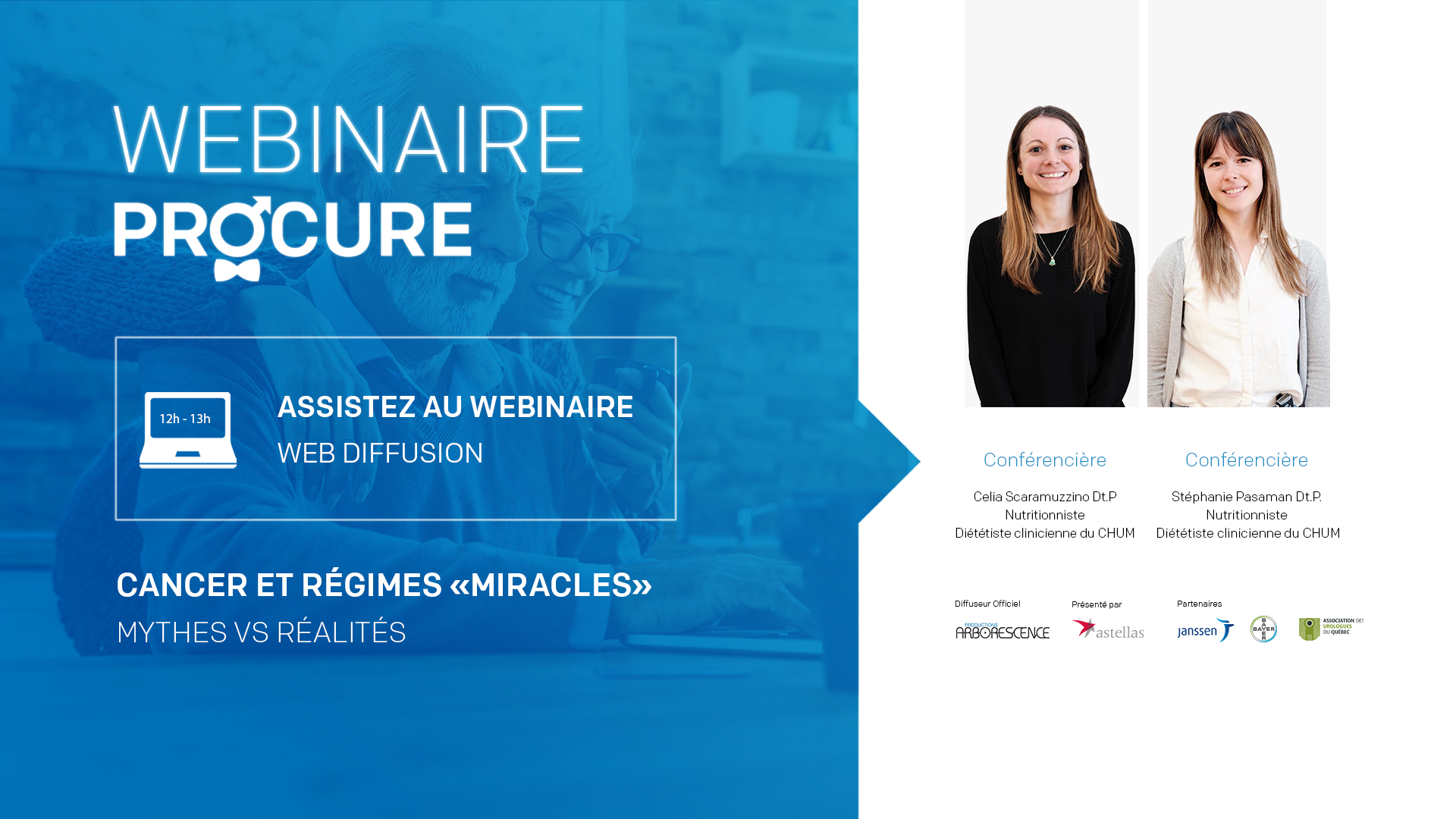The side effects of prostate cancer treatment can make it difficult to maintain a healthy diet. Here are some tips and advice when chemo gets on your eating plate.
The different treatments can make you nauseous, cause anemia, osteoporosis, intestinal inflammation (radiation enteritis), affect your taste, lower your interest in food, or make you gain weight that is hard to lose. Remember that most side effects will fade with time.
Finding the perfect food…
But what kind of diet should I follow during treatment? For the patient and his loved ones, it’s not always easy to know:
- what to eat
- how to prepare their meals
- how to sort fact from fiction when it comes to all the suggestions you get
In this article, we mainly want to discuss the effects that chemo can have on your diet and give you some tips to mitigate them.

But before we do…
It is important to know if a medication should be taken before, during, or after a meal, as this can influence the assimilation of the active substances it contains and, therefore, the effectiveness of the treatment.
And you also need to pay attention to what you eat/drink during your treatment. The best-known example of this interaction is probably grapefruit juice. This can influence the efficacy, side effects, and toxicity of many drugs, including some treatments for cancer.
General tips for dealing with changes in your appetite
Loss of appetite
- Prepack 3 small protein- and calorie-rich meals
- Snack between meals to increase your food intake
- Always have calorie-dense snacks on hand (cookies, nuts, chocolate, etc.)
- Spend some time on meal presentation
- Eat in a quiet environment
Feeling full quickly, early satiety
- Prepack 3 small protein-and calorie-rich meals
- Snack between meals to increase your food intake
- Avoid drinking during your meal, instead drink between meals
Fatigue
- Ask for help with meal preparation
- Have meals delivered to your home
- Read more in our section Tips for Fighting Fatigue
Tips for handling digestive and sensory problems
Changes in taste and smell
- Have good dental hygiene
- Try out new recipes
- Serve food cold to reduce its taste
- Season your food with spices or herbs to make them more flavourful
- Avoid smelly foods
Mouth sores or mouth pain
- Have good oral hygiene
- Avoid food that can irritate your mouth, such as, overly salty, sweet, or spicy foods
- Try changing the texture of your food: ground, pureed, liquid
Difficulty swallowing
- Try changing the texture of your food: chopped, pureed, liquid
Nausea & vomiting
- Try to recognize what time of day your feelings of nausea are most intense
- Snack between meals to increase your food intake
- Eat foods you enjoy
- Choose food and drinks that are cool or chilled
- Avoid fatty foods (fried foods, charcuteries, sauces, etc.)
- Avoid strong odours—strong smells can cause nausea
Diarrhea
- Avoid high-fiber foods (fruits, vegetables, wholegrain cereals, legumes, and pulses)
- Avoid drinking milk because of its high lactose content
- Choose foods known for their constipating effect (rice, cooked carrots, bananas, grated apples)
- Stay well-hydrated
Constipation
- Choose high-fiber foods (fruits, vegetables, wholegrain cereals, legumes, and pulses)
- Drink more liquids, minimum of 1.5 L/day
- Exercise regularly whenever possible
If your symptoms are affecting your appetite, consult a dietician who will help you plan meals tailored more to your needs. In case of severe symptoms, speak to your doctor immediately.
Break old habits. Don’t feel like cooking?
Why not try some store-bought dishes from the supermarket or have leftovers from the night before? You can also try eating breakfast food at night or microwaving more of your meals or snacks. Don’t be scared to do or try something new if it helps you eat.
Take the time to visit each of our pages on this website, as well as our YouTube channel, in order to get familiar with the disease with our expert lectures, our section on available resources, the support that is offered to you.
Do you have any questions or concerns? Above all, do not hesitate. Contact us at 1 855 899-2873 to discuss with a nurse specializing in uro-oncology. It’s simple and free, like all our services.
Conference that might interest you (in French only)
Pages of our site that might interest you
Want to know more? Just click on one of the links below.
Nutrition and Treatments
Bowel Disorders
Manage Your Symptoms
PROCURE news that may interest you
Each week, we publish a blog article. Here are a few for you.
What is an anti-inflammatory diet?
Written by PROCURE. © All rights reserved – 2020



 ADDITIONAL RESOURCES
ADDITIONAL RESOURCES


